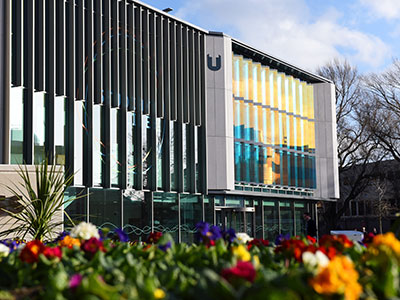Course overview
Visual Effects
Hear what some of our undergraduate and postgraduate students have to say about studying visual effects here at Teesside.
As well as giving you professional skills in key areas of the visual effects post-production pipeline such as previsualisation, modelling, rigging, scripting, tracking, technical animation, effects animation, lighting, look development and compositing, this course enables you to explore your own specialism in greater depth. Gain experience of the wider pre-production and production pipelines and emulate industry practice by working collaboratively in teams with students from other animation courses on industry-led briefs and short films. As well as dedicated studios featuring industry-standard VFX software, you have access to dedicated specialist camera and grip equipment, motion-capture studios, and a fully equipped sound stage including green screen facilities and motion-control cameras.
Ranked 20th in the world in the Animation Career Review International Animation School Rankings 2025. (Top 50 International Animation Colleges – formal degree. 207 colleges considered.) Find out more at tees.ac.uk/source.
Course details
Course structure
Core modules
Collaborate in a multi-disciplinary production team, working across MA Animation and MA Visual Effects. Contribute specialist skills to create a short film or VFX sequence, following a professional studio pipeline. The result is a high-quality showpiece for your portfolio.
Develop core skills in digital compositing for the VFX pipeline using industry-standard software and techniques. Work across the full pipeline from planning and acquisition to the final output of a finished shot. You also develop skills in creating seamless motion sequences that integrate live action, CG content and photographed elements.
Develop core skills in digital matte painting through practical application and theoretical insight in the context of VFX production and how to apply them using industry-standard software. Work with live action footage, 3D tracking, digital painting and compositing to create immersive digital environments. Produce a final sequence that combines 2D imagery, filmed elements, CG content and set extensions to transform an establishing shot.
You complete a multidisciplinary group project in your area of interest to create a short film or video game cutscene.
You work in an individual production role within small teams to create an original short film or cutscene, which provide a high-end showpiece for your portfolio.
Industry Research and Development
Research and development are essential across animation, visual effects and games. Solving technical and creative problems through research and investigation to create stunning animation, effects and assets. Explore an area of specialist interest through a research-informed workflow, iterating through design, development and evaluation to produce a working prototype or proof of concept. Address technical and creative production challenges using advanced methods relevant to industry practice. This module tests your ability to solve industry-relevant production problems through research-informed design.
Motion design features across media from film and TV to promos and educational content. You research and develop procedural and simulation-driven solutions to design challenges, applying creative approaches across a range of industry-standard techniques.
Explore the theories behind destruction-based simulation techniques and apply them using industry-standard software. Analyse real-world phenomena alongside visual effects from film and television productions to produce high-quality simulations suitable for professional use.
Modules offered may vary.
How you learn
You learn about concepts and methods primarily through keynote lectures and tutorials using case studies and examples. Lectures include presentations from guest speakers from industry. Critical reflection is key to successful problem solving and essential to the creative process. You develop your own reflective practice at an advanced level, then test and assess your solutions against criteria that you develop in the light of your research.
How you are assessed
The programme assessment strategy has been designed to assess your subject specific knowledge, cognitive and intellectual skills and transferable skills applicable to the workplace. The strategy ensures that you are provided with formative assessment opportunities throughout the programme which support your summative assessments.
There is a mix of practical work (usually in the form of a portfolio), poster and viva presentations, written reports, and professionally presented ‘breakdown’ videos commonly used in industry.
Formative feedback is typically given during lectures, tutorials and summative feedback using on-line methods.
Entry requirements
At least a UK 2.2 honours degree in visual effects or equivalent.
- Other first degree subjects may be accepted when combined with a portfolio of creative work at an acceptable standard.
- For international students (Tier 4) - IELTS 6.
- International and EU students must also pass a University English test.
Get some hints and tips on how to prepare a portfolio
For general information please see our overview of entry requirements
International applicants can find out what qualifications they need by visiting Your Country
Employability
Career opportunities
You have many opportunities to develop your professional skills, links with industry and meet with recruiters through our Expo Series, Animex Festival and Student Futures activities.
Graduates from our Visual Effects degrees have gone on to enjoy successful careers in studios around the world working on visual effects for film, television, animation and games.
Graduates have gone on to work in a range of areas including previs, modelling, rigging, production, effects animation, matte painting, tracking and matchmove, lighting, look development and compositing. They are working for companies including Industrial Light and Magic, Weta Digital, Double Negative, Moving Picture Company, Cinesite, The Third Floor, The Mill, Pixar, Digital Domain, Framestore and many more.
Information for international applicants
Qualifications
International applicants - find out what qualifications you need by selecting your country below.
Select your country:
Useful information
Visit our international pages for useful information for non-UK students and applicants.


